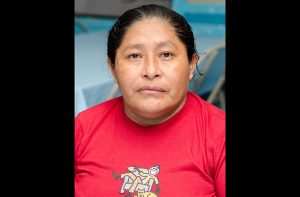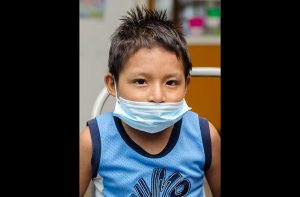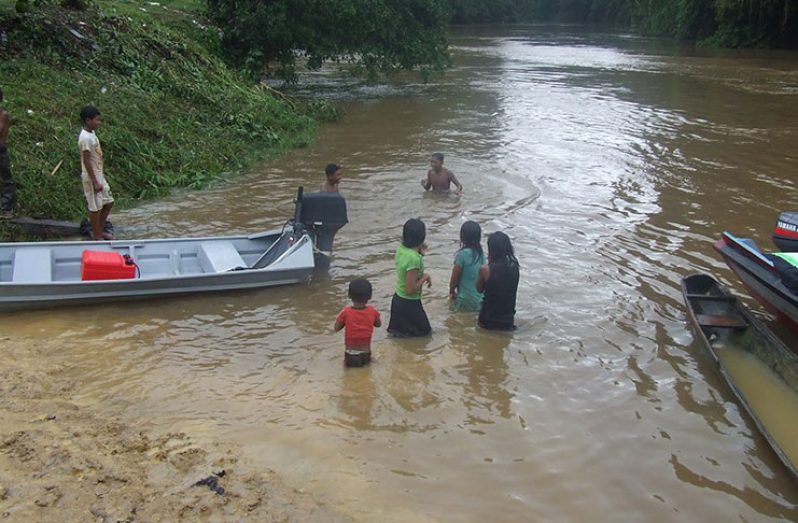ADRIAN Andres of the beautiful indigenous village of Kato, Region Eight, is a happy child who enjoys playing football, cricket and Nintendo games; but all is not well with him.Just over a year ago, his mother Antonia Andrews noticed that, strangely, he began to eat less and became weak, with no improvement in his condition. Around the same time, his

teachers also reported to her that Adrian, during classes, appeared dazed and was unable to concentrate.
“I became worried,” Antonia, who has eight other children, said. Pointing out that “Adrian was reducing in size and was listless in his action”, the mother told Guyana Chronicle that initially she thought it was a sickness that comes and goes away, only to realise that the condition of her last child was getting from bad to worse.
It was at this point that young Adrian was taken to the Kato Cottage Hospital for a medical checkup, and after a series of tests, he was found to be free of malaria, a disease his mother Antonia thought he had.
She was at a loss, and not long after, Adrian’s teachers advised her to keep him home and make every effort to diagnose his illness.

“At the time I did not know what to do or where to go, and I believe God listened to my prayers. It was not long after (that) a team of doctors visited the village, and I took him to them. They did several tests on him, and sent the samples to Georgetown to be tested. I had hope, but my spirit dampened when the results came back,” she said.
Young Adrian, who was forced to drop out of school due to illness, was diagnosed with leukemia.
According to medical authorities, leukemia is a group of different cancers of the blood cells. Leukemia can be acute or chronic, and people with chronic leukemia may not notice any symptoms before the condition is diagnosed with a blood test.
Symptoms of leukemia include fevers, night sweats, and swollen lymph nodes that are typically not painful or tender. Fatigue, weight loss, and bone or joint pain are other potential symptoms.
Soon after being diagnosed, Adrian, accompanied by his mother, was flown to the city to be treated at the Georgetown Public Hospital. Antonia, who for the time being is a resident at the Amerindian Hostel at Princess Street, Georgetown, told the Guyana Chronicle that less than a year after starting chemotherapy, her son has regained weight and appears healthy.
A few months ago he was discharged from hospital, but still goes there for checkups and

treatment. When the Guyana Chronicle visited him at the hostel, he was seen wearing a mask and playing a Nintendo game.
The mask, his mother said, protects him from new infections. “I am very happy to see him in better shape,” she told this publication.
ONE OF SEVERAL CASES
Dr. Latoya Gooding, who treats Adrian, related that he is just one of an increasing number of cases of childhood cancer she has been treating in the past year.
“For the past year, 11 children (have been) diagnosed with cancer. These are testicular cancer, leukemia (9 cases) and Non-Hodgkin lymphoma. Non-Hodgkin lymphoma is a cancer that starts in cells called lymphocytes, which are part of the body’s immune system. Only one case has been diagnosed with this form of cancer,” Dr. Gooding said.
She also disclosed that during this time, four of the children died, including the one with testicular cancer, which is very rare in children.
Dr. Gooding, who works in the Oncology Department at the Georgetown Public Hospital, revealed that of the 11 children diagnosed, six are from the hinterland regions.
“These are diagnosed cases. There are probably many others in the hinterland regions with cancer who do not know they have it. I have even received reports of children dying from cancer-like conditions there. This is a situation the Ministry of Public Health needs to investigate. So much attention is placed on breast cancer and cervical cancer, but little or no attention is placed on childhood cancer and cancer in the hinterland region,” the Cuban-trained doctor said, also pointing out that more than 50 per cent of adults diagnosed with cancer are from the remote mining areas of Guyana.
SUSPECTED NEXUS
While there has been no study to ascertain the cause(s) of cancer in these parts of Guyana, Dr. Gooding believes that pollution of waterways due to mining is a primary cause.
Laura George of the Amerindian Peoples Association (APA) told the Guyana Chronicle that the suspected link between water pollution due to mining and cancer in the hinterland regions needs investigation, as it may not be far-fetched.

Residents in the hinterland regions use water from the rivers and other channels to do household chores such as cooking and washing, apart from
Drinking and bathing in it. According to Dr. Gooding, chemicals from mining operations getting into the waterways is a cause for concern, and the situation is exacerbated when communities use those water channels for drinking and cooking.
“I am very much aware that our waterways are highly compromised today, and we have not undertaken any study, even an informal one, on the health implications it has on residents,” George said.
She also noted that the water in the rivers is often not potable.
“A walk into Micobie and you will see the Potaro River…the Mazaruni River… the communities of Ominaik/Kambaru, Jawalla, Quebanang, and Kamarang — the water they use is so dirty. The Barama River that is used by residents at Kariako, Kokerite and Chinese Landing…and they are forced to go to the tributaries of these rivers to get drinking water,” George told this publication as she reiterated her call for an investigation into the suspected link between water pollution due to mining and cancer in the hinterland regions.
The suspected link, Minister within the Ministry of Public Health, Dr Karen Cummings, said, is an issue she is hearing for the first time, but she noted that it would be investigated.
She called on hinterland residents to do regular checkups at health centres in their communities, pointing out that the Ministry of Public Health is placing strong attention on raising awareness of cancer and building a healthy population.




.png)









